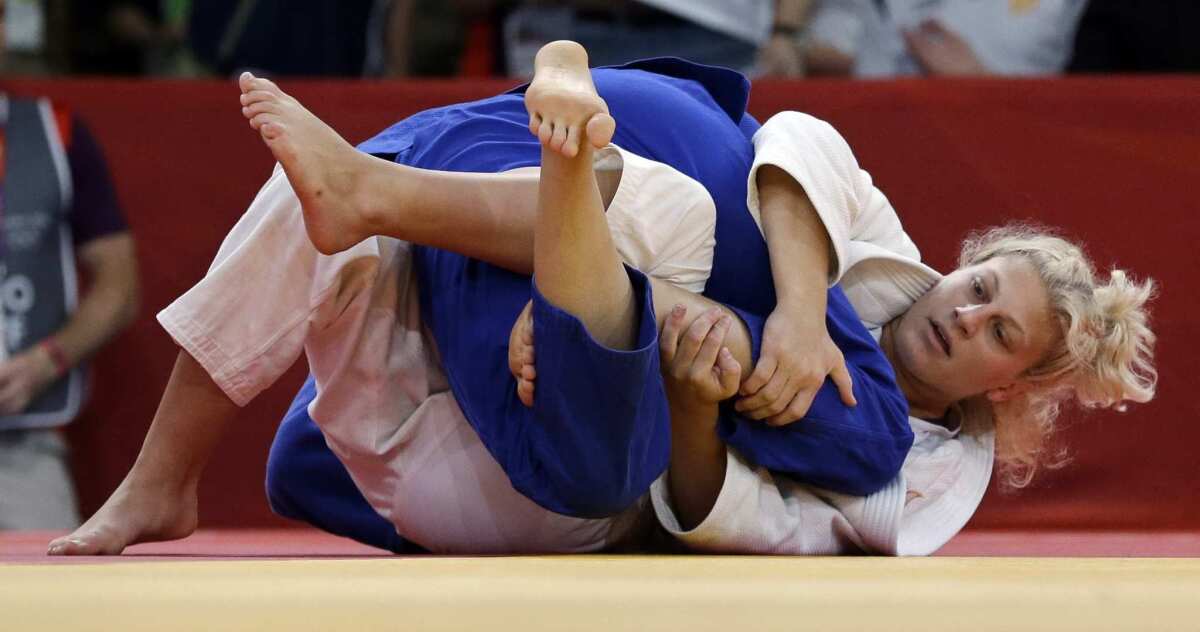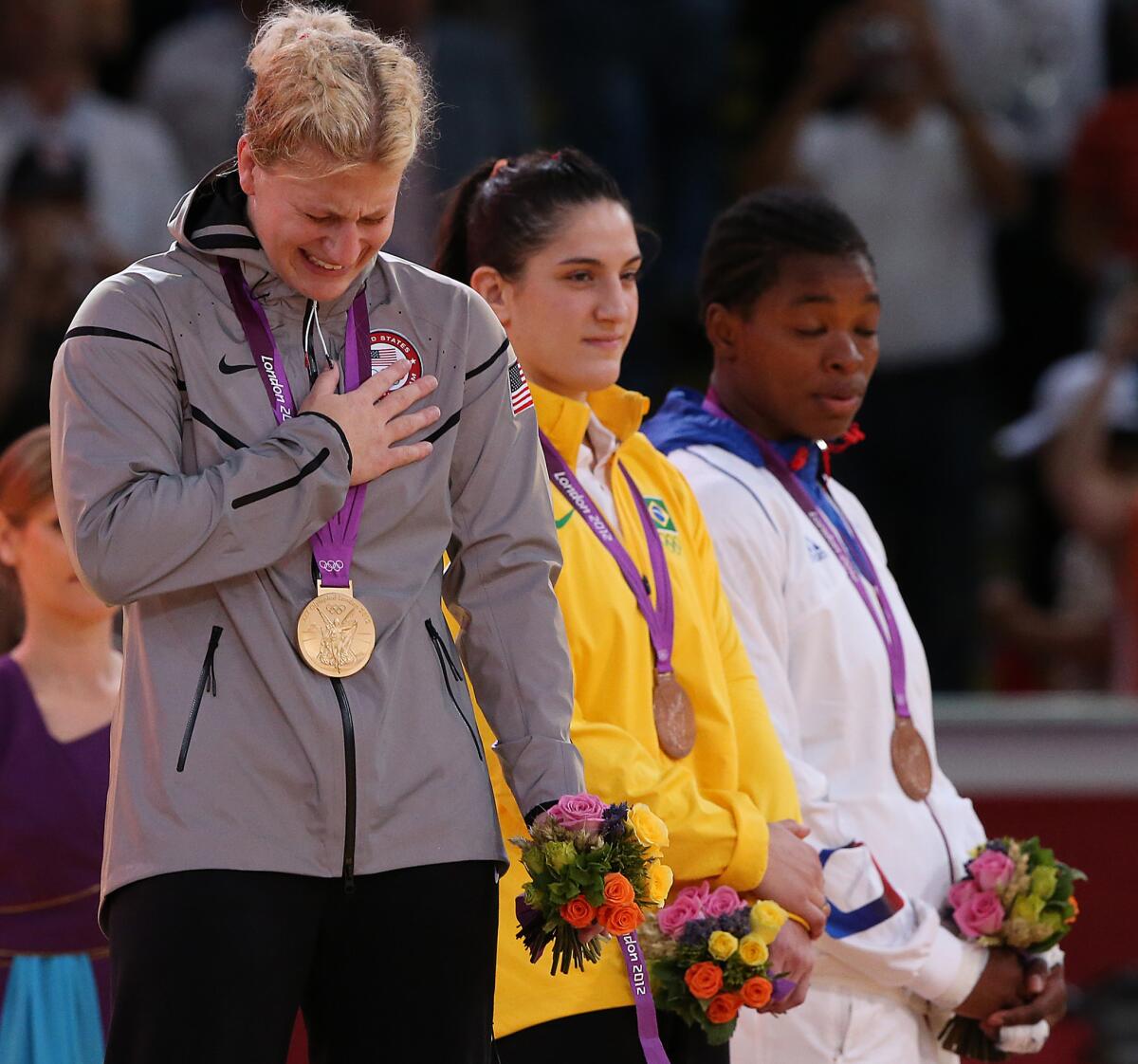Kayla Harrison raises her profile, now wants to raise her Olympic medal count

- Share via
Kayla Harrison couldn’t even walk when she took two of the biggest steps on her path to the Rio de Janeiro Olympics.
It was June 2013 and Harrison, 10 months after becoming the first American to win a gold medal in judo, was flat on her back in a hospital bed, her surgically reconstructed left knee encased in a straight-leg brace and her future very much in doubt.
After the London Games, Harrison had planned to retire from judo and follow Ronda Rousey, her former training partner, to mixed martial arts riches. Then she stepped out of bed one morning and her knee collapsed, temporarily taking that decision out of her hands. For the next six weeks she did little more than eat, think and watch Netflix.
It was the longest break from judo since she was 6 years old, and that hurt more than the surgery did. So as her knee healed, she began reconstructing her future as well.
“You have a lot of time to think about your life and what you want to do,” she said. “I couldn’t imagine not ever setting foot on a mat again. I was scared of who I would be without judo and decided I was going to do everything in my power to get back on a mat.”
Only this time, it wouldn’t be only about her.
Since London, Harrison has launched her own company, signed with a management firm, landed a number of endorsements and started doing speaking engagements. Her coach, Jimmy Pedro, says all of this has raised both her income and her profile to levels previously unknown in U.S. judo. Now she’s trying to raise both the income and profile of her sport.
Three weeks ago, USA Judo announced that Harrison’s company had signed a five-year deal to organize and operate the national championships, which will offer prize money for the first time. The Kayla Harrison Cup, another prize-money tournament, will include top judokas from all over the world
“Between Kayla’s personality and by supporting judo, we think that she can bring in sponsors and get some people interested,” Pedro said.
If that’s the professional goal, there’s also a personal one. Before the London Games, Harrison spoke publicly of the sexual abuse she had suffered at the hands of a former coach. So during her convalescence she decided to turn those words into action by launching the Fearless Foundation to provide help for the survivors of childhood sexual abuse and by retelling her story in a memoir she hopes will become a guide for victims and their families.
“It’s bigger than me. It’s bigger than a gold medal,” she said of her foundation. “Judo is a very selfish thing. I’m not solving world hunger. I’m not making the world a better place by trying to throw someone on their back.”
Yet Harrison’s ability to do those other things would grow immeasurably with another gold medal in Rio, a win that would make her the first repeat champion in the half-heavyweight category (172 pounds). She says that has driven her through the pain of recovery and training sessions so difficult she’s often in tears by the time they end.
Not that pain or tears are anything new for Harrison.

United States judo wrestler Kayla Harrison holds back tears as the national anthem plays during her gold medal ceremony at the London 2012 Olympics.
After following her mother, a black belt, into the gym when she was 6, Harrison fell in love with judo and progressed so quickly that by 8 she had joined the elite Renshuden Judo Academy in Centerville, Ohio. That was where she met Daniel Doyle, a coach 16 years her senior.
Doyle quickly became a trusted family friend, babysitting Harrison and her two siblings, accompanying them on vacations and hosting sleepovers. He also began molesting Harrison when she was 13.
Eventually she confided in a judo friend, Aaron Handy, who took the details to Harrison’s mother. That wasn’t the end. When Harrison testified against Doyle, who received a 10-year prison sentence, she became infamous in her small Ohio town.
She had thoughts of suicide and wanted to run away from home before eventually finding sanctuary at a judo center in suburban Boston. It was a strict, tough-love place and Harrison struggled at first, but Pedro and his dad, Jim, refused to let her quit, enrolling her in school and therapy and slowly rebuilding her confidence.
“The Pedros changed my life. And they saved my life,” said Harrison, who rewarded them with a gold medal.
The pain is mostly gone now, hidden within a bubbly, bright blond who, away from the mat, is mostly grins and giggles. But Harrison, 26, who says the experiences are never far gone, had to choke back her emotions when she related the story of a rape victim who credited Harrison’s story with giving her the strength to go on.
“That to me is more important than any number of gold medals,” the Olympian said.
Repeating will be difficult, though. Not only was the recovery from knee surgery difficult, but Harrison will likely have to climb over Brazil’s Mayra Aguiar to reach the top of the podium in Rio. The two have met 17 times, with Harrison winning nine matches, the most recent in May at the World Masters event in Mexico.
Yet no matter what color medal she gets, Harrison — who Pedro said has matured noticeably in the last four years — has enjoyed the journey.
“Early in my career it was so much about winning that I didn’t really stop and smell the roses,” said Harrison, who is reconsidering a move to MMA. “This last cycle I’ve really enjoyed it, even the crappy parts. I’m like, ‘This is all happening for a reason.’
“These are the best days of my life. I’m going to look back some day and be like, ‘Wow. I was in the best shape of my life. I was doing something I love. People wanted to hear what I had to say. It was my party and everyone was invited.’ Some day it’s not going to be like that.
“So my mind-set’s changed a lot, but in a good way.”
More to Read
Go beyond the scoreboard
Get the latest on L.A.'s teams in the daily Sports Report newsletter.
You may occasionally receive promotional content from the Los Angeles Times.







